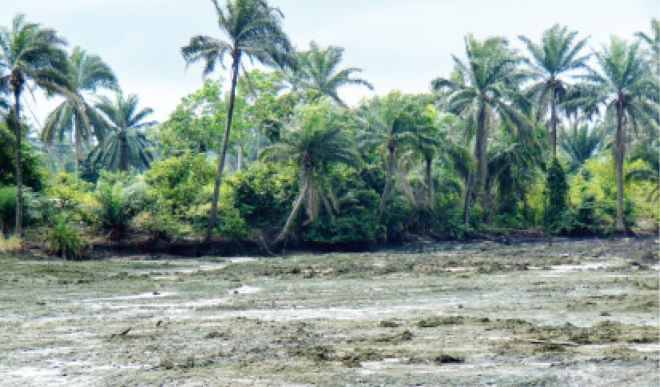
It is a dead creek and a careful look at what we may call its carcass, reveals that it must have been a beautiful place at one time. Europeans used to leave Port Harcourt to visit Goi, in order to take a look at its creek and the creek was a source of fish, large and tasty fish ,and many other forms of aquatic and animal life ,and even birds not seen in the cities could be seen there. If you are there it is easy to imagine that this must have been true of the place at one time. When you visit Goi , a community in Rivers state, what you see is the empty shell of the creek which once thrived and attracted many creatures, including monkeys. Goi has gone. It lies between two oil fields namely the Bomu oil field and the Bodo West oil field, and the two oil fields have had a negative effect on Goi. A court case in respect of environmental pollution within the Goi creek is the subject of a dispute between the community and Shell, which is currently being heard at the Hague.
The empty wreck of the creek is all that remains of a 2004 fire that occurred there and burned for 7 days. That was a moment of pure hell for the ecosystem. It was also hell of a sort for the community, for several shrines were burnt during the fire.Pollution did not only hurt and expel the inhabitants, it also hurt the people in a psychic, non tactile sense by consuming the shrines of their deities. It was an apocalypse, an Armageddon occurring in nature as well as within their cosmology. Goi is now a wasteland in both a physical and non-physical sense. The burning of the shrines may be compared to the destruction of a place of Worship ,and the people Daily Trust interacted with, can connect with these very intuitions.
Today, not a single bird flies through or stops by to grab any wandering earthworm ,snail or form of aquatic life. But there are no earthworms here, and no snails, and thus no birds are drawn to the place. There is no aquatic life left. What is apparent is a fairly unpleasant smell which lingers and haunts you whichever way you turn. A lone fisherman suddenly returns. He hardly looks upwards, maybe he cannot ,for life has become a constant search for a means to survive since the inferno visited the creek. With head bent downwards, he is on the watch for a crab, snail or other aquatic life that would bring some moments of joy to his home. He left early in the morning to try his luck. It is evening now, but his bag swings easily in the gentle wind.It is empty. Goi is an economy on its knees, and it is an example of the slow depopulation of a riverine community in the Niger Delta. Or it may be an example of population displacement on account of oil exploration activities in the region. The community lacks the human population which a few neighbouring communities possess. Neighbouring Bodo, where funerals occur every weekend, will soon rival Goi, in terms of a lack of human population. Many years of pollution on account of oil exploration activities, have triggered illnesses in Bodo, and people are dying, some of them just 34 or 36 years old. The weekly funerals at Bodo do not bode well for the region.
Mene Dooh, the traditional prime minister of Goi tells me “In 2003 there was a devastating spill from the Bomu manifold and that place is higher than our location. The moment there is a spill at the Bomu manifiold, it flows downwards through the creek. That is how pollution occurs through the Bomu manifold, which is an oil field. This place is called Dor Bah creek, the principal creek in Goi community.” He comments on the 2004 fire outbreak “The fire outbreak consumed the whole of the mangrove forest and shrines located along the coast. There are many more shrines associated with our deities which were consumed by fire.” He explains “As a result of the devastation of all these shrines, our people now fled. They fled into the diaspora, because they are connected to the shrines. The other reason why they left is because our people here are basically fishermen and farmers, but the fertility of the place is no longer there. If you cultivate the soil,you will get nothing.
People decided not to cultivate the soil, but to look for other places where the soil is fertile. If you look at this creek, the environment once had a thick mangrove forest. As a result of pollution and the devastation of the mangrove forest, it is no longer mangrove.” Dooh laments “Fish cannot come and breed in this sort of environment. Fish breed in an environment that has enough mangrove forests,which are conducive for spawning, and because of the devastation of the environment, fish no longer come here. They area itself is heavily contaminated.” He adds that in 2006 the Hydro Carbon Pollution Restoration Agency visited Goi and noticed “that the area is heavily polluted as a result of the geographical position of Goi, lying between two oilfields. They reasoned that a heavily impacted area such as this one does not need people to dwell in. They argued that it was no longer safe for people to inhabit, and so they mounted signboards, and instructed everybody to vacate Goi.”
He returns to the theme of the 2004 fire outbreak “The fire covered the whole place, and it was burning for a whole week. I went to the police as well as to Shell to complain. The Almighty sent rain, a heavy downpour at night, and by daybreak the fire was put out.In those days people regularly go to fish. They would catch enough fish, to sell, and they would consume some, and keep some too. But now we no longer have fish. If there were mangrove forests,you would be seeing fish, crabs, tilapia inside the swamp. It is no longer like that again.”




